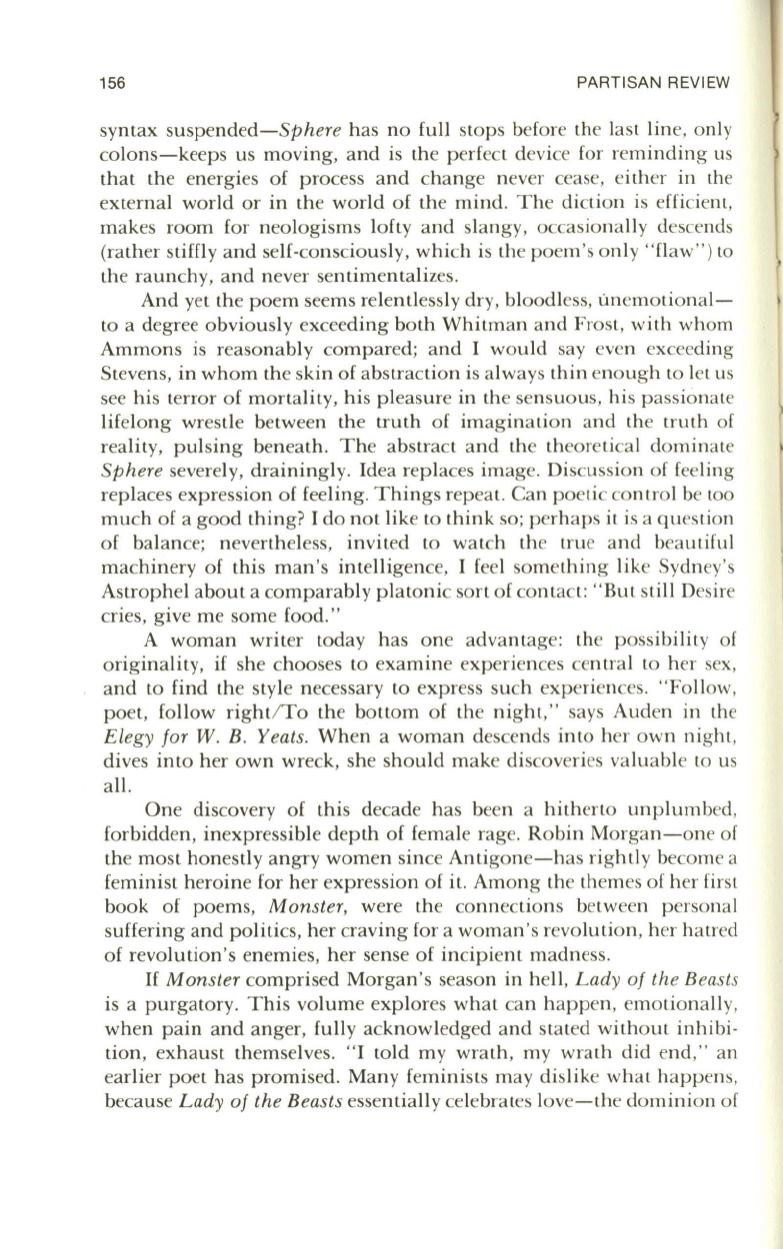
156
PARTISAN REVIEW
syntax
suspended-Sphere
has no full stops before the last line, only
colons-keeps us moving, and is the perfect device for reminding us
that the energies of process and change never cease, either in the
external world or in the world of the mind. The diction is efficient,
makes room for neologisms lofty and slangy, occasionally descends
(rather stiffly and self-consciously, which is the poem's only "flaw") to
the raunchy, and never sentimentalizes.
And yet the poem seems relentlessly dry, bloodless, unemotional–
to a degree obviously exceeding both Whitman and Frost, with whom
Ammons is reasonably compared; and I would say even exceeding
Stevens, in whom the skin of abstraction is a lways thin enough to let us
see his terror of mortality, his pleasure in the sensuous, his passionate
lifelong wrestle between the truth of imagination and the truth of
reality, pulsing beneath. The abstract and the theore tical dominate
Sphere
severely, drainingly. Idea replaces image. Discussion of feeling
replaces expression of feeling. Things repeat. Can poetic control be too
much of a good thing? I do not like to think so; perhaps it is a ques tion
of balance; nevertheless, invited to watch the true and beautiful
machinery of this man's intelligence, I feel something like Sydney's
Astrophel about a comparably platonic sort of contact: "But still Desire
cries, give me some food."
A woman writer today has one advantage: the possibility of
originality, if she chooses to examine experiences central to her sex,
and to find the style necessary to express such experiences. "Follow,
poet, follow rightlTo the bottom of the night," says Auden in the
Elegy for
w.
B. Yeats.
When a woman descends into her own night,
dives into her own wreck, she should make discoveries valuable to us
all.
One discovery of this decade has been a hitherto unplumbed,
forbidden, inexpressible depth of female rage. Robin Morgan-one of
the most honestly angry women since Antigone-has rightly become a
feminist heroine for her expression of it. Among the themes of her first
book of poems,
Monster,
were the connections between personal
suffering and politics, her craving for a woman's revolution , her hatred
of revolution's enemies, her sense of incipient madness.
If
Monster
comprised Morgan's season in hell,
Lady of the Beasts
is a purgatory. This volume explores what can happen, emotionally,
when pain and anger, fully acknowledged and stated without inhibi–
tion, exhaust themselves. " I told my wrath, my wrath did end," an
earlier poet has promised. Many feminists may dislike what happens,
because
Lady of the Beasts
essentially celebrates love-the dominion of


